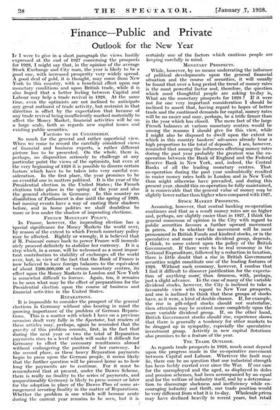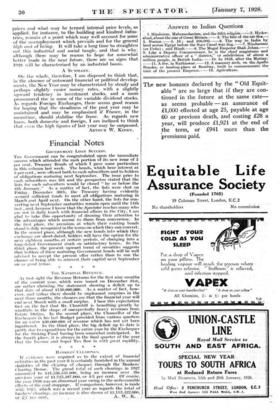Finance—Public and Private
Outlook for the New Year
IF I were to give in a short paragraph the views hastily expressed at the end of 1927 concerning the prospects for 1928, I might say that, in the opinion of the average Stock Exchange and City man, the year is likely to be a good one, with increased prosperity very widely spread. A good deal of gold, it is thought, may come from New York to this country, with a beneficial effect upon our monetary conditions and upon British trade, while it is also hoped that a better feeling between Capital and Labour may help a trade revival in 1928. At the same time, even the optimists are not inclined to anticipate any great outburst of trade activity, but restraint in that direction is offset by the expectation that because of any trade revival being insufficiently marked materially to affect the Money Market, financial activities will be on a large scale, both as regards new capital issues and existing public securities. FACTORS TO BE CONSIDERED.
So much for the general and rather superficial view. When we come 'to record the carefully considered views of financial and business experts, a rather different picture has to be presented. On the whole, there is, perhaps, no disposition seriously to challenge at any particular point the views of the optimists, but even at the very beginning of 1928 it is possible to discern certain factors which have to be taken into very careful con- sideration. In the first place, the year promises to be an eventful one in matters political. It is the year of the Presidential election in the United States ; the French elektions take place in the spring of the year and also the general elections in Germany. In this country no dissolution of Parliament is due until the:spring of 1929, but coming events liaVe a way of casting their shadows before, and in home politics we shall doubtless be more or less under the of impending electioni.
FRENCH MONETARY POLICY.
In- France, however, the impending election has a special significance for Money Markets the world over, zeason of the extent to which French monetary policy inay be affected. Rightly or wrongly, it is believed that if M. Poincare comes- back-to power France will immedi.: ately proceed definitely to stabilize her currency. It is a "step which, in a sense, will be welcomed as a most impor2 Cant contribution to stability of exchanges all the world Over, but, in view of the fact that the Bank of France is how believed to have foreign balances to-the equivalent of about £200,000,000 at various monetary centres, its effect upon the Money Markets in London and New York is somewhat difficult to foresee. Again, too, it remains to be seen *hat may be the effect of preparations for the Presidential election upon the course of business and financial activities in the United States.
REPARATIONS.
• It is impossible to consider the prospect of the general elections in Germany without also bearing in mind the growing importance of the problem of German Repara- tions. This is a matter with which I have on a previous occasion dealt very fully in, the Spectator, but readers of these articles may, perhaps, again be reminded that the gravity of this problem consists, 'first, in the fact that during the next year or two the total of Reparation. payments rises to a level which will make it difficult for Germany to effect the necessary remittances abroad without endangering the position of her currency. the second place, as these heavy Reparation payments: begin to press upon the German people, it seems likely. that the further question will be pressed home as to how' long the payments are to continue. For it must be- remembered that at present, under the Dawes Scheme, there is really no finality to the series of payments, and unquestionably Germany is likely to press sooner or later for the adoption in place of the Dawes Plan of some ar-: rangement securing finality in the matter of Reparations. Whether the problem is one which will become acute- during the current year remains to be seen, but it is certainly one of the factors which cautious people are keeping carefully in mind.
MONETARY PROSPECTS.
While, however, by no means underrating the influence of political developments upon the general financial situation and the course of securities, it will usually be found that over a long period the trend of money rates is the most powerful factor and, therefore, the question which most thoughtful people are asking to-day is, What are the monetary prospects for 1928? If it were not for one very important consideration I should be inclined to assert that, having regard to hopes of better trade and the continued demands for capital, money rates will be no easier and may, perhaps, be a trifle firmer than in the year which has closed. The mere fact of the large French balances at various monetary centres would be among the reasons I should give for this view, while I might also be disposed to dwell upon the extent to which in this country bankers' advances •already bear a high proportion to the total of deposits. I am, however, reminded that among the influences affecting money rates during the past year probably the greatest was the co- -operation between the Bank of England and the Federal Reserve Bank in New York, and, indeed, the Central Banks of all the leading monetary centres. That co-operation during the past year undoubtedly resulted in easier money rates both in London and in New York than might otherwise have prevailed, and during this present year, should this co-operation be fully maintained, it is conceivable that the general value of money may be slightly lower rather than higher when compared with 1927.
STOCK MARKET PROSPECTS.
Assuming, however, that central banking co-operation continues and that as a result money rates are no higher and, perhaps, are slightly easier than in 1927, I think the general consensus of opinion in the City with regard to public securities favours a further upward movement in prices. As to whether the movement will be most pronounced in British Funds and kindred stocks, or in the speculative and more variable dividend group, depends, I think, to some extent upon the policy of the British Government. If there were to be real economy in the National Expenditure, followed by a reduction in taxation, there is little doubt that a rise in British Government securities 'might constitute one of the leading features of 1928. Without such economy, however, I confess that I find it difficult to discover justification for the expecta- tion of anything more: than firmness, with, perhaps, just a slight advance. In the case of many of the variable dividend stocks, however, the City is inclined to take a favourable view with regard to New Year prospects, and one is inclined to think that these groups of stocks have, as it were, a kind of double chance. If, for example, the rise in gilt-edged stocks should not materialize, then attention may be centred more completely upon the more variable dividend group. If, on the other hand, British Government stocks should rise, experience shows that there is generally a tendency for other markets to be dragged up in sympathy, especially the speculative investment group. Activity in new capital flotations also promises to be a feature of the year.
THE TRADE OUTLOOK.
As regards trade prospects in 1928, much must depend upon •the progress made in the co-operative movement between Capital and Labour. Wherever the fault may lie, there can be no question that our industrial strength has been feebly exerted ever since the War. If our care for the unemployed and the aged, as displayed in doles and pension schemes, had been accompanied by an equal zeal for the welfare of industry itself, and by a determina- tion . to discourage slackness and inefficiency while en- couraging industry and thrift, our trade position would be very different from what it is to-day. Wholesale prices may have declined heavily in recent years, but retail prices and what may be _termed internal price levels, as applied, for. instance, to the_building and kindred indus- tries, remain at a point which may well account for some of the unemployment which prevails and for the general high cost of living. It will take a long time to straighten out this industrial and social tangle, and that is why, although there may be reason to hope for somewhat better trade in the near future, there are no signs that 1928 will he characterized by an industrial boom.
A SUM3IARY.
On the whole, therefore, I am disposed to think that, in the absence of untoward financial or political develop- ments, the New Year may be characterized by steady and perhaps slightly easier money rates, with a slightly upward tendency in investment stocks, and a more pronounced rise in some of the variable dividend stocks. As regards Foreign Exchanges, there seems good reason for hoping that the steadiness of the past year may be maintained and may be emphasized if France, in the meantime, should stabilize the franc. As regards new loans, both domestic and foreign, I am inclined to think that even the high figures of last year may be surpassed.
AsTwrit W. KIDDY.







































 Previous page
Previous page